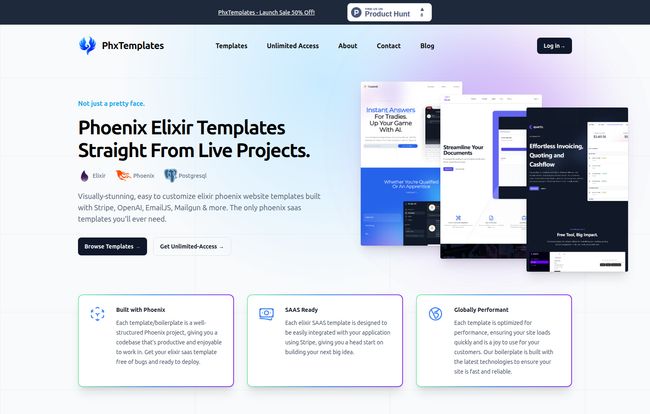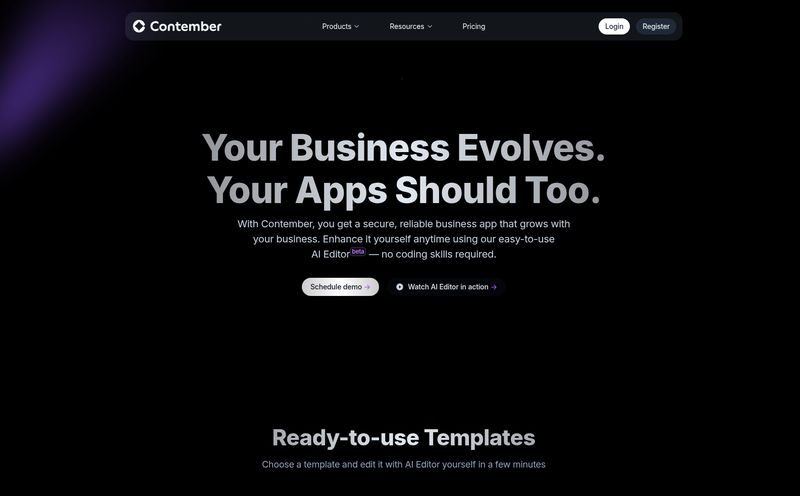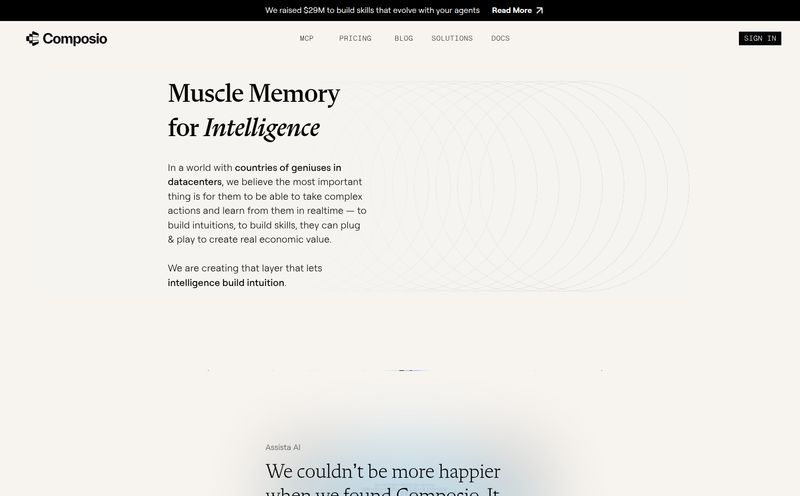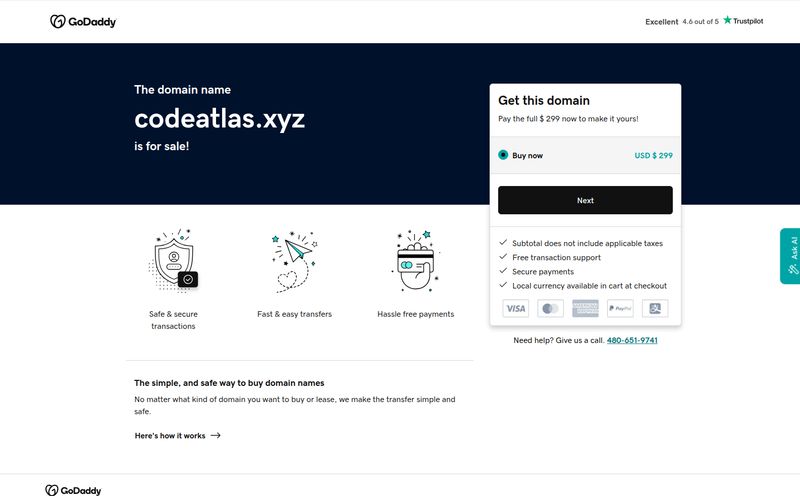We’ve all been there. That jolt of inspiration for a new SaaS idea, that decision to finally launch your professional portfolio, or the sudden urge to start a tech blog. The energy is high, the ideas are flowing... and then you hit the wall. The same old wall we always hit: setting up the project. User authentication. Billing integration. A decent-looking front end. The basic CRUD for blog posts. It’s a vortex of boilerplate code that can suck the life out of a great idea before you even write a single line of your core logic.
It's the digital equivalent of needing to build the factory before you can invent the widget. Frustrating, right?
I’m always on the lookout for tools that cut through this initial grind. Anything that gets me from idea to MVP faster is a win in my book. So when I stumbled across PhxTemplates, my curiosity was definitely piqued. It promises production-ready Phoenix templates for SaaS, portfolios, and blogs, all built with the lovely Elixir. A shortcut through the boilerplate jungle? You have my attention.
So, What's the Big Deal with PhxTemplates?
At its core, PhxTemplates is a launchpad. Think of it less like a blank canvas and more like a high-quality, pre-assembled race car chassis. You don't have to waste your time welding the frame, installing the engine, and wiring the electronics; you get to focus on the fun stuff—tuning the performance, picking the paint color, and actually driving the thing. The platform provides beautifully designed, functional website templates built on the Phoenix framework. We're talking SaaS boilerplates, portfolio sites, and blog setups that are ready to go.
This isn't just about pretty designs, though. The whole point is to give you a massive head start. They claim you can “Skip the Headache” and go from zero to a live, functional website in minutes. A bold claim, but one that resonates with any developer who has spent a weekend wrestling with OAuth configurations for the tenth time.

Visit PhxTemplates
A Peek Under the Hood at the Features
Okay, so it sounds good on paper. But what are you actually getting? I took a look at their offerings, and it’s a pretty compelling package, especially if you're already in the Elixir/Phoenix camp.
The Template Trio: SaaS, Portfolio, and Blogs
They seem to focus on the three most common project types developers tackle. The examples they showcase are clean and modern. I saw mockups for a 'PDF.ai' SaaS, a sleek developer portfolio, and a classic blog layout. This specialization is smart. Instead of trying to be everything to everyone, they're catering to specific, high-demand use cases. The Fast Phoenix SaaS template, for instance, comes with user management and billing baked in. That alone saves days, if not weeks, of work.
Integrations That Just Make Sense
This is where PhxTemplates really shines for me. A template is one thing, but a template with critical integrations already wired up is another. They include:
- Stripe: For accepting payments. An absolute must-have for any SaaS product. Getting this set up correctly and securely is a non-trivial task, so having it ready is a huge plus.
- EmailJS & Mailgun: For handling transactional emails like sign-ups, password resets, and notifications. Another one of those foundational pieces you just can't launch without.
- OpenAI: This was a pleasant surprise. Including an OpenAI integration shows they’re not just building for today, but thinking about the AI-powered features of tomorrow. It's a very forward-thinking touch.
Built for Search Engines from the Get-Go
As an SEO guy, my eye immediately went to their “SEO Optimized” claim. So many developer-focused boilerplates treat SEO as an afterthought. You get a functional app with a search engine visibility of zero. The fact that PhxTemplates bakes in SEO best practices from the start is a massive selling point. It means you’re not starting from a deficit and having to refactor half your code later just to get Google to notice you. A clean structure, fast load times (a hallmark of Phoenix), and proper meta handling are all part of this.
My Honest Take on the Good and the Not-So-Good
Alright, let's get down to it. After looking through what PhxTemplates offers, I have some thoughts. For me, the value proposition is crystal clear. The biggest advantage is speed. The time you save not building auth, billing hooks, and a responsive frontend is time you can spend on what actually makes your product unique. For a startup or a solo founder, that's not just a convenience—it's a competitive advantage.
I also appreciate the well-structured Phoenix codebase. A good boilerplate shouldn’t just work, it should be a pleasure to work with. It should teach you best practices, not force you to inherit someone else’s messy code. From what I can see, they’ve put care into making the code clean and maintainable.
But Are There Any Catches?
Of course, no tool is perfect for everyone. It’s not all sunshine and rainbows. First, and most obviously, you need to be comfortable with Elixir and Phoenix. This is a tool for a specific niche of developers. If you're coming from a PHP or Node.js background, this isn’t going to be a plug-and-play solution for you. It’s a professional tool for professionals in that ecosystem.
Second, you’re still working within the confines of a template. While they’re customizable, a template always has an underlying structure. If your vision is something radically different from their base design, you might spend more time fighting the template than you would have building from scratch. It's a classic trade-off: speed for total creative freedom.
Finally, there's a reliance on third-party services. Your app will depend on Stripe, Mailgun, etc. This is standard for modern web development, but it's something to be aware of. Your app's functionality is tied to their uptime and any changes they make to their APIs. Not a dealbreaker by any means, just a reality of building on teh modern web.
What About the Pricing?
This is the million-dollar question, isn't it? At the time of this writing, the pricing isn't listed directly on the landing page. This usually points to a one-time purchase model per template, which is common for boilerplates. You buy the codebase and it’s yours to use forever. I'd anticipate a price point that reflects the immense time savings—likely a few hundred dollars. In the grand scheme of SaaS development costs, that's a drop in the bucket. I'd recommend checking their site directly for the most up-to-date pricing information.
So, Who is This Really For?
After my analysis, I have a pretty clear picture of the ideal PhxTemplates user.
- The Elixir-savvy Solo Founder: You know Phoenix, and you want to launch your SaaS yesterday. This is your fast track.
- The Freelance Developer: You need to spin up high-quality, modern sites for clients quickly without reinventing the wheel on every project.
- The Prototyper: You have an idea and want to build a functional MVP to test the market without getting bogged down in foundational code.
Who isn't it for? Total beginners, no-coders, or teams who need a completely bespoke design from the ground up and have the time and resources to build it.
Final Thoughts
In the world of software development, starting is often the hardest part. PhxTemplates offers a compelling solution to that problem for a specific, and growing, community of developers. It’s a powerful accelerator, a way to jump past the boring stuff and get right to the heart of your project.
If you live and breathe Elixir and Phoenix, and you value your time, I think taking a serious look at PhxTemplates is a no-brainer. It might just be the push you need to finally get that next big idea off the ground and into the world.
Frequently Asked Questions
What exactly is PhxTemplates?
PhxTemplates provides pre-built, production-ready website templates for SaaS applications, portfolios, and blogs. They are built using the Elixir programming language and the Phoenix web framework to help developers launch projects much faster.
What programming skills do I need to use PhxTemplates?
You should have a working knowledge of Elixir and the Phoenix framework. These are not no-code templates; they are professional codebases designed to be customized and extended by developers familiar with this tech stack.
What key integrations come with the templates?
The templates come with essential integrations pre-configured, including Stripe for payments, EmailJS and Mailgun for email handling, and even an OpenAI integration for building AI-powered features.
Are the templates optimized for SEO?
Yes, one of the key features is that the templates are designed with SEO best practices in mind from the start. This includes a clean code structure, fast performance inherent to Phoenix, and proper metadata handling to help your site rank better on search engines like Google.
Can I build a complex SaaS with these templates?
Absolutely. The templates provide the boilerplate or foundation—user management, billing, basic structure. You are expected to build your unique, complex application logic on top of this solid starting point.



